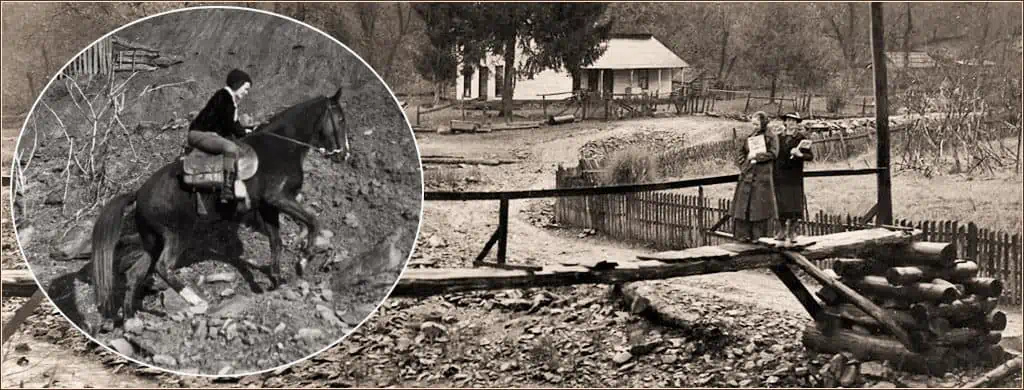
Determined to increase literacy and boost morale in the backwoods of Depression era Appalachia, hundreds of Pack Horse Librarians, with saddlebags jammed full of books, headed out for some of county’s most impoverished and isolated communities.
May Stafford, Nan Milan, Lena Nofcier, Elizabeth Fullerton and Grace Caudill Lucas. You may not know their names, but during America’s Great Depression they were part of the Works Progress Administration’s (WPA) Pack Horse Library initiative established as part of FDR’s New Deal in 1935. Its goal was to bring books and reading material deep into a 10,000-square-mile part of eastern Kentucky — one of the most desperately poor regions of Appalachia, where food, education and economic opportunity were hard to come by.
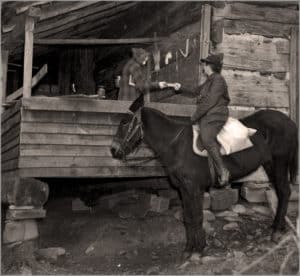
In 1930, some 31% of eastern Kentuckians couldn’t read, but wanted to learn. With coal and the railroads set to industrialize the state, its potential workforce saw literacy as a ladder out of poverty and a means to reap the benefits of the prosperity they hoped for.
The Pack Horse Librarians, or “book women,” as they became known in Appalachia, were the first rungs on that ladder.
Eleanor Roosevelt
The packsaddle library program was founded by Elizabeth Fullerton and modeled on a 1913 program with roots in the Kentucky Federation of Women’s Clubs in the late 19th century. Eleanor Roosevelt was a champion of the initiative, visiting small WPA libraries as she traveled around the country inspecting FDR’s New Deal programs.
Local WPA headquarters figured approximately 800 books were needed to share and circulate among the region’s 5,000 to 10,000 patrons. And while the WPA could pay its roving librarians, it could not afford to stock their saddlebags. Books and magazines came from outside donations. As the call went out, PTAs and private donors in more affluent and library-accessible regions in half the states in America responded. Once the precious donations came in, the librarians first worked to preserve them, repairing them and even repurposing old Christmas cards as bookmarks so people might be less apt to dog-ear the pages.
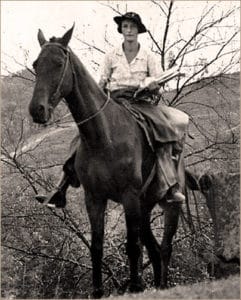
Using their own horses or mules, or renting them from neighbors, the Pack Horse Librarians stuffed their saddlebags with books, magazines, Sunday school materials and carefully-assembled scrapbooks of stories, pictures and recipes. Recruited locally, they were familiar faces to families wary of outsiders. They rode through Appalachia’s creeks and up into the mountains at least twice a month, delivering, picking up and recirculating reading material throughout eastern Kentucky, covering routes of 100-120 miles a week in all weather, for which they earned $28/month, or roughly $515 in today’s currency.
50,000 families
In 1936, the Pack Horse Librarians served 50,000 families and, by 1937, 155 rural schools. Students who had never visited a library or checked out a book would rush out to meet the book women, asking for a book to read — illustrated books were especially popular. It was a time when illiterate adults relied on their literate children to help them decipher the books.
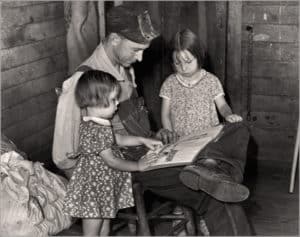
Contemporary newspapers in 1935 wrote, “The intelligence of the Kentucky mountaineer is keen … honest, truthful and God-fearing, he grasped and clung to the Pack Horse Library idea with all the tenacity of one starved for learning.”
By the end of 1938, the Pack Horse Library had 274 book women covering 29 counties. In total, the program provided employment for almost 1,000 librarians on horseback.
Ended by war effort
In 1943, President Franklin D. Roosevelt ordered the end of the WPA and its projects — including the Pack Horse Library program — as America’s new war effort was putting people back to work. Eastern Kentucky’s book women and their horse-delivered books would be replaced by motorized bookmobiles that delivered reading material across Appalachia’s streams and into its mountains, By 2014, according to the Institute of Museum and Library Services, Kentucky’s public libraries had 75 bookmobiles — the largest number in America.
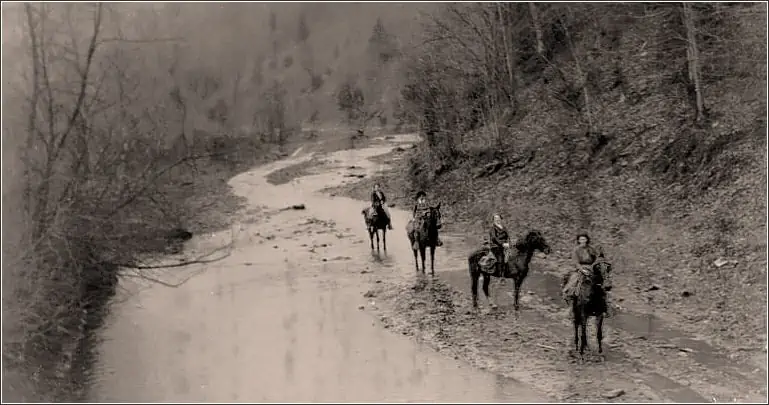


Read also GIVER OF STARS by JoJo Myers.
Read “The Book Woman of Troublesome Creek” & am now reading “The Book Woman’s Daughter “ about these women. Both excellent and written by Kim Michele Richardson. Hard to imagine all they had to go through to bring a little of the wealth of books we now take for granted.
Dear Ms. Levins,
I am a senior citizen who went back to graduate school after I retired from the international apparel business. I am writing a paper on the subject of the WPA project, The Pack Horse Librarians of Kentucky, and I would like to be in touch with you to discuss the program and perhaps gather ideas for sourcing this story.
I also see that you have a faux food business, which I find interesting. I travelled extensively in Asia for forty years on business and I saw my share of faux foods displayed mainly as restaurant menus, the best being in Japan.
I am Freyda Hensley . I am a native Californian and I am hoping you can contact me. We may be the same age, or close. I was born in 1948.
Looking to hearing from you shortly.
Best Regards,
Freyda